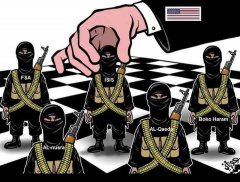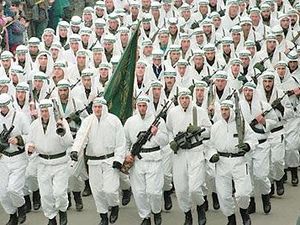"Islamic terrorism"
(“Terrorism”, enemy image) | |
|---|---|
 | |
| Interest of | • Active Change Foundation • Club de Berne • Julia Ebner • Jon Hazel • Gilles Kepel • Gilles de Kerchove • Hanif Qadir • Quilliam Foundation • Search for International Terrorist Entities |
| A trenchant enemy image, reinforced by the clandestine arming and training of groups under Operation Gladio/B | |
Islamic "terrorism" is a staple part of Operation Gladio/B, which was drawn up in the mid 1990s to replace fear of communists with fear of "Islamic terrorists" in particular and Islamophobia in general.
Contents
Official narrative
Extremists are increasingly being radicalised by their twisted conception of the Muslim faith, and expressing their anger in violent ways, including suicide bombings. This requires ever more strict monitoring of civil society to keep people safe.
Origins
The modern wave of references to "Islamic "terrorism"" can be traced back to the 1979 Jerusalem Conference on International Terrorism. This was an international a nexus of deep politicians who later profited from the "war on terror", both financially and in that it facilitated the deeper purposes they sought to achieve through the "War on Terror".
9/11
- Full article:
 9-11
9-11
- Full article:
The Amerithrax anthrax attack was originally blamed on "Islamic terrorists". However, as with the 1995 OKC bombing, this diagnosis proved untenable and was adjusted to blame not US citizens, but a single "lone nut", Bruce Ivins. The attacks on New York and Washington D.C. are still officially attributed to Ossama Bin Laden's Al Qaeda.
Post 9/11
The 21st century saw a rapid increase in highly publicised attacks, often after less publicised drills. The commercially-controlled media generally presumed these attacks to have been carried out by Moslems.
Al Qaeda
- Full article: Al Qaeda
- Full article: Al Qaeda
Al Qaeda was the supranational deep state's main brand of "Islamic terrorism" post 9-11, and many attacks were attributed to them, including the 2004 Madrid train bombings and the 2005 London Bombings.
Islamic State
- Full article: Islamic State
- Full article: Islamic State
Sibel Edmonds commented[When?] that the "Islamic State" was a back-up terror brand used when fear of Al Qaeda had subsided somewhat.[citation needed]
Islamophobia
- Full article: “Islamophobia”
- Full article: “Islamophobia”
The 21st century has seen a rise in Islamophobia (and in the last few years, probably xenophobia in general), at least in the Western world. This can be seen as a success for the strategy of tension pushed by Operation Glabio B. Some nations, notably France, have enacted laws to outlaw or restrict some styles of dress traditionally preferred by Moslems.[1] The European Court of Human Rights upheld a French law banning veils on 1 July 2014, accepting the argument of the French government that the law was based on "a certain idea of living together."[2]
Cold War II
- Full article: Cold War II
- Full article: Cold War II
The UK Deep state has been promoting the concept of Cold War II through groups such as the Integrity Initiative, possibly as a fallback in case the British public tire of Islamic terrorism.
Examples
| Page name | Description |
|---|---|
| Al-Nusra Front | Al-Qaeda franchise in Syria |
| Al-Qaeda | A sketchy term that has been repeated endlessly by the corporate media. Its close connections to Western intelligence agencies are never examined. "The Brotherhood" of the modern era. |
| Boko Haram | Nigerian "terror group" suspected to be a CIA front to destabilize the region as part of the "war on terror". |
| ISIS-K | ISIS branch in South Asia and Central Asia. |
| Islamic State | An "Islamic fundamentalist terrorist" organisation which whistleblower Sibel Edmonds links to Operation Gladio/B and succinctly describes as a re-branding of al-Qaeda. |
| Turkistan Islamic Party |
Related Quotations
| Page | Quote | Author | Date |
|---|---|---|---|
| "Counter-terrorism" | “The current threat from Islamist terrorism is serious and sustained. It is genuinely international in scope, involving a variety of groups, networks and individuals who are driven by particular violent and extremist beliefs. It is indiscriminate – aiming to cause mass casualties, regardless of the age, nationality, or religion of their victims; and the terrorists are often prepared to commit suicide to kill others. Overall, we judge that the scale of the threat is potentially still increasing and is not likely to diminish significantly for some years. ” | July 2006 | |
| "Extremism" | “the distinction between “non-violent extremism” and “violent extremism” is not a valid one.” | Alex Schmid | May 2014 |
| Robin Cook | “So long as the struggle against terrorism is perceived as a war that can be won by military means, it is doomed to fail. The more the West emphasises confrontation, the more it silences moderate voices in the Muslim world who want to speak up for cooperation.” | Robin Cook | 8 July 2005 |
| Philip Haney | “(He) was ordered by the DHS to alter or modify information because it was not politically correct. The problem with Saudi Arabia in relation to terrorism, said Haney, is that the country supports Islamic schools called madrasas in Pakistan, India, and Bangladesh. They send Saudi males there to be educated in Koranic theology and other Islamic texts, and these schools often function as a breeding ground for terrorist organizations” | Philip Haney | |
| Fatima Lahnait | “Spain remains a target for Islamist extremists. Moreover, like other European countries, it is now facing an increasing radicalisation phenomenon that may lead to violent extremism and home-grown Islamist terrorism.” | Fatima Lahnait | 2018 |
| Douglas Murray | “Sara Khan is a deeply admired and respected figure among the small community of people in the UK actually dedicated to challenging Islamist extremism.” | Douglas Murray | 1 February 2018 |
| Hanif Qadir | “I could have prevented [the 2017?] London terrorist attacks” | Hanif Qadir | 2017 |
| Religion | “Some years ago, a leaked MI5 behavioural study of pathways to terrorism concluded that there was no single profile or pathway to violent radicalisation. It also found, contrary to conventional assumptions, that religious conservatism tended to act as a bulwark against extremism.” | Nafeez Mosaddeq Ahmed | 13 February 2015 |
Official examples
| Name |
|---|
| 2014 Kunming Attack |
| 2016 Orlando nightclub shooting |
| 9-11 |
| Mujahedin-e Khalq |
